19 aug 2015
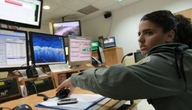
Haaretz Israeli newspaper, on Wednesday, said that the Israeli military intelligence monitors all BDS groups and activities all over the world.
According to report by the newspaper, the Israeli military intelligence monitors the international groups, while the local groups supporting BDS are monitored by the Shin Bet (General Security Service), says PNN.
The movement aims to Boycott, Divest and Sanction Israel for its war crimes against Palestinians. The campaign thrived after last summer’s Israeli offensive on Gaza, which killed over 2,200 Palestinians, most of them children and civilians, and injured at least 11,000 people.
BDS succeeded to cause Israel an economic, academic and worldwide damage after it’s war crimes and ongoing occupation. Since then, Israel’s concerns were growing with the support for the movement, especially after a series of unions, groups and companies declared their affiliation to the international boycott.
On 6 June, Channel Ten explained that Israel has already begun to feel the effects of the potential damage to the Israeli economy, and an Israeli official warned that the government had run out of ways to combat the BDS threat.
Following that, on 18 June, The Israeli Justice Minister, Ayelet Shaked was said to be putting together a plan of action and has already instructed that the number of positions in the international department be doubled so that it can push ahead with the program as soon as possible.
The minister called on filing civil and criminal lawsuits against BDS activists for damaging Israeli trade, describing the movement as “discriminatory and racist”.
Shaked last year called on Israel killing Gaza’s children and mothers, saying that “They have to die and their houses should be demolished so that they cannot bear any more terrorists.”
According to report by the newspaper, the Israeli military intelligence monitors the international groups, while the local groups supporting BDS are monitored by the Shin Bet (General Security Service), says PNN.
The movement aims to Boycott, Divest and Sanction Israel for its war crimes against Palestinians. The campaign thrived after last summer’s Israeli offensive on Gaza, which killed over 2,200 Palestinians, most of them children and civilians, and injured at least 11,000 people.
BDS succeeded to cause Israel an economic, academic and worldwide damage after it’s war crimes and ongoing occupation. Since then, Israel’s concerns were growing with the support for the movement, especially after a series of unions, groups and companies declared their affiliation to the international boycott.
On 6 June, Channel Ten explained that Israel has already begun to feel the effects of the potential damage to the Israeli economy, and an Israeli official warned that the government had run out of ways to combat the BDS threat.
Following that, on 18 June, The Israeli Justice Minister, Ayelet Shaked was said to be putting together a plan of action and has already instructed that the number of positions in the international department be doubled so that it can push ahead with the program as soon as possible.
The minister called on filing civil and criminal lawsuits against BDS activists for damaging Israeli trade, describing the movement as “discriminatory and racist”.
Shaked last year called on Israel killing Gaza’s children and mothers, saying that “They have to die and their houses should be demolished so that they cannot bear any more terrorists.”
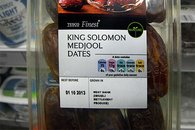
Arab League Assistant Secretary-General for Palestinian affairs Mohamed Sobeih on Tuesday called for activating an Arab boycott of Israeli products. Speaking at a meeting at the Cairo-based Arab League, Sobeih said the Arab boycott of Israeli products "will enhance Palestinian steadfastness".
"The boycott...is a political message that reflects rejection of [any] violation of international law, the UN Charter and UN resolutions," he said.
Sobeih noted that Israeli banks fear an Arab and international boycott.
"This is a step forward...and sends a message against a rogue state," he said.
The meeting is expected to forward recommendations to the Arab foreign ministers, who are scheduled to meet on Sept. 10.
Peace talks between Israelis and Palestinians collapsed last year over Israel's refusal to release a group of Palestinian prisoners despite an earlier pledge to do so.
"The boycott...is a political message that reflects rejection of [any] violation of international law, the UN Charter and UN resolutions," he said.
Sobeih noted that Israeli banks fear an Arab and international boycott.
"This is a step forward...and sends a message against a rogue state," he said.
The meeting is expected to forward recommendations to the Arab foreign ministers, who are scheduled to meet on Sept. 10.
Peace talks between Israelis and Palestinians collapsed last year over Israel's refusal to release a group of Palestinian prisoners despite an earlier pledge to do so.

Formal condemnation issued after a Spanish reggae festival enacts discriminatory policy, axing the sole Jewish American act for his "Zionism."
The Spanish government condemned on Tuesday a Spanish reggae festival's decision to cancel a concert by an American Jewish musician after he failed to reply to a demand he clarify his position on Palestinian statehood.
Spain said it rejected boycott campaigns and any sign of anti-Semitism, while reiterating its support for an independent Palestinian state through bilateral negotiations.
"Imposing a public declaration (from Matisyahu), puts into question the principle of non-discrimination on which all plural and diverse societies are based," the Spanish foreign ministry said in a statement on Tuesday.
The Spanish festival issued its own reasoning for the cancellation. "Rototom Sunsplash, after having repeatedly sought dialogue in the face of the artist's unavailability to give a clear statement against war and on the right of the Palestinian people to their own state, has decided to cancel the concert," they said in a statement.
The Israeli Embassy in Madrid has also denounced what it called “ideological censorship” by the festival, adding that, as the singer is not Israeli, the decision appeared to carry “anti-Semitic overtones.”
Jewish groups protest
The cancellation drew protest from Jewish groups around the world. The Spanish Federation of Jewish Communities condemned the decision as cowardly, unjust and discriminatory, saying that Matisyahu had been asked to take a political position because he was Jewish when this was not required of other performers.
World Jewish Congress President Ronald Lauder also expressed outrage at the decision, urging Spanish authorities "to take appropriate action against those responsible for it."
Matisyahu himself took to facebook to expose the injustice. "Honestly it was appalling and offensive, that as the one publicly Jewish-American artist scheduled for the festival they were trying to coerce me into political statements. Were any of the other artists scheduled to perform asked to make political statements in order to perform? No artist deserves to be put in such a situation simply to perform his or her art."
The Spanish government condemned on Tuesday a Spanish reggae festival's decision to cancel a concert by an American Jewish musician after he failed to reply to a demand he clarify his position on Palestinian statehood.
Spain said it rejected boycott campaigns and any sign of anti-Semitism, while reiterating its support for an independent Palestinian state through bilateral negotiations.
"Imposing a public declaration (from Matisyahu), puts into question the principle of non-discrimination on which all plural and diverse societies are based," the Spanish foreign ministry said in a statement on Tuesday.
The Spanish festival issued its own reasoning for the cancellation. "Rototom Sunsplash, after having repeatedly sought dialogue in the face of the artist's unavailability to give a clear statement against war and on the right of the Palestinian people to their own state, has decided to cancel the concert," they said in a statement.
The Israeli Embassy in Madrid has also denounced what it called “ideological censorship” by the festival, adding that, as the singer is not Israeli, the decision appeared to carry “anti-Semitic overtones.”
Jewish groups protest
The cancellation drew protest from Jewish groups around the world. The Spanish Federation of Jewish Communities condemned the decision as cowardly, unjust and discriminatory, saying that Matisyahu had been asked to take a political position because he was Jewish when this was not required of other performers.
World Jewish Congress President Ronald Lauder also expressed outrage at the decision, urging Spanish authorities "to take appropriate action against those responsible for it."
Matisyahu himself took to facebook to expose the injustice. "Honestly it was appalling and offensive, that as the one publicly Jewish-American artist scheduled for the festival they were trying to coerce me into political statements. Were any of the other artists scheduled to perform asked to make political statements in order to perform? No artist deserves to be put in such a situation simply to perform his or her art."
18 aug 2015
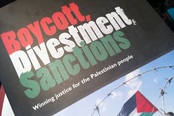
Communication officers of the regional offices for boycotting Israel are to hold their 89th meeting in the Arab League headquarters on Tuesday, alamatonline.net has reported.
The Arab League official with responsibility for the occupied Palestinian territories, and the general commissioner of the head boycotting office, said on Monday that the officers meeting in the conference would spend three days discussing ways to activate an Arab boycott of Israel.
Mohamed Sbeeh indicated that a number of issues are related to different Arab-owned companies which violate the boycott rules, and ways to impose sanctions on them. A number of US companies with branches in Israel will also be considered for sanctions. He indicated that they would discuss the modification of the general boycott principles in order to reactivate them.
According to Sbeeh, the boycott of Israel is one of the mechanisms adopted to express the Arab rejection of Israeli "practices and violations" in occupied Arab lands. EU and US boycott campaigns have cost the Israeli economy more than $20 billion, he pointed out. The boycott by those Arab countries which do not have diplomatic relations with Israel should be added to that cost.
"A boycott," explained Sbeeh, "is an internationally-recognised economic weapon." It was used previously against the Apartheid regime in South Africa, he noted.
The conclusions of the meeting will be presented at the upcoming meeting of the Arab foreign ministers in September. It is expected to be attended by all Arab countries expect those having relations with Israel.
The Arab League official with responsibility for the occupied Palestinian territories, and the general commissioner of the head boycotting office, said on Monday that the officers meeting in the conference would spend three days discussing ways to activate an Arab boycott of Israel.
Mohamed Sbeeh indicated that a number of issues are related to different Arab-owned companies which violate the boycott rules, and ways to impose sanctions on them. A number of US companies with branches in Israel will also be considered for sanctions. He indicated that they would discuss the modification of the general boycott principles in order to reactivate them.
According to Sbeeh, the boycott of Israel is one of the mechanisms adopted to express the Arab rejection of Israeli "practices and violations" in occupied Arab lands. EU and US boycott campaigns have cost the Israeli economy more than $20 billion, he pointed out. The boycott by those Arab countries which do not have diplomatic relations with Israel should be added to that cost.
"A boycott," explained Sbeeh, "is an internationally-recognised economic weapon." It was used previously against the Apartheid regime in South Africa, he noted.
The conclusions of the meeting will be presented at the upcoming meeting of the Arab foreign ministers in September. It is expected to be attended by all Arab countries expect those having relations with Israel.
17 aug 2015

The Palestinian BDS National Committee (BNC) calls on people of conscience around the world to initiate and/or escalate boycott and divestment campaigns against the companies that are most complicit in these Israeli crimes, in response to an unprecedented appeal from Palestinian political prisoners in Israeli jails. The appeal came in the context of an escalation in Israel’s repression against Palestinian political prisoners.Israel’s systematic use of torture, a crime against humanity under international law, as a policy against Palestinian prisoners, including child prisoners, has recently seen a sharp rise.
Israel, which remains one of few countries in the world that legalizes torture under circumstances deemed as “necessary,” has passed at the end of July a law allowing the force-feeding of Palestinian prisoners who have resorted to hunger strikes as a last ditch attempt to achieve their basic rights and dignity.
The Israeli prison authorities’ attempt to implement the new force-feeding law against 31-year-old Palestinian lawyer and current administrative detainee, Muhammed Allan, has triggered wide Palestinian protests and international condemnation by the UN and numerous human rights organizations.
The BNC calls upon Palestinian and international human rights organization to document the names of Israeli political, military, intelligence and medical figures who are implicated in the systematic and decades-old policy of torture and ill-treatment of Palestinian and other Arab prisoners, in order to bring them to trial at the International Criminal Court.
The national leadership of Palestinian prisoners sent a letter last week to the global BDS movement through the BNC asking for prioritizing the cause of the prisoners and intensifying BDS campaigning against Israeli and international corporations that are most complicit in the crimes committed by Israel against them. The letter read:
“The international [BDS] campaign that you are leading, and that is increasing in effectiveness and outreach day after day, constitutes today a wave of pressure on the [Israeli] occupation government and its institutions. It has become the most important carrier of the voice of the oppressed in the land of Palestine.”
In 2012, the BNC, along with many Palestinian human rights organizations, launched a large international BDS campaign against G4S, the British-Danish private security company that is deeply involved in Israel’s violations of prisoners’ rights and international law.
The boycott campaign has cost G4S many contracts around the world, including in the US, Ireland, Norway, South Africa, among others.
In 2014, the campaign resulted in the Bill and Melinda Gates Foundation’s divestment of all its stock in the company, estimated at more than $180. Around the same time, one of the largest protestant churches in the US, the United Methodist Church, also withdrew its investment from the company.
A large number of trade unions, organizations and student councils around the world have also announced their refusal to contract G4S until it ends its collusion in Israel’s crimes against the Palestinian people.
Under this intense pressure from the BDS movement, G4S executives announced in June 2014, at their general shareholders meeting, their intention not to renew the company’s contract with the Israeli prison authority when it lapses in 2017. The decision was confirmed in the shareholders’ meeting this year.
The BDS movement considered the company’s decision an insufficient first step in the right direction. Accordingly, it called for an escalation in the boycott campaign against G4S to compel it to immediately cancel all its contracts with Israel that violate international law and human rights.
Today, with the bloody escalation of Israel’s repressive and criminal measures against Palestinian prisoners, the BNC calls for intensifying boycott and divestment campaigns against the following corporations that are most deeply involved in Israel’s violations of our prisoners’ rights:
1. G4S: provides protection and security systems to the following Israeli prisons and detention centers: Ketziot, Megiddo, Damoun, Ofer, Russian Compound, Abu Kabir and Jalamah.
2. HP: provides electronic equipment and hardware maintenance services to the Israeli prison authority.
3. Volvo, which owns 26% of Merkavim, provides buses used in transferring prisoners. Torture and ill-treatment of prisoners is rife during these transfers.
4. Siemens: provides security and fire-extinguishing systems to Israeli prisons, including Gilboa.
5. Ashtrom: responsible for building Hasharon prison (where female Palestinian prisoners are detained). It also provided pre-fabricated units for Ofer and Ramon prisons.
6. Shamrad: provides security devices for Ramla, Beersheba, Ayalon, Ketziot and Hasharon prisons.
Israel, which remains one of few countries in the world that legalizes torture under circumstances deemed as “necessary,” has passed at the end of July a law allowing the force-feeding of Palestinian prisoners who have resorted to hunger strikes as a last ditch attempt to achieve their basic rights and dignity.
The Israeli prison authorities’ attempt to implement the new force-feeding law against 31-year-old Palestinian lawyer and current administrative detainee, Muhammed Allan, has triggered wide Palestinian protests and international condemnation by the UN and numerous human rights organizations.
The BNC calls upon Palestinian and international human rights organization to document the names of Israeli political, military, intelligence and medical figures who are implicated in the systematic and decades-old policy of torture and ill-treatment of Palestinian and other Arab prisoners, in order to bring them to trial at the International Criminal Court.
The national leadership of Palestinian prisoners sent a letter last week to the global BDS movement through the BNC asking for prioritizing the cause of the prisoners and intensifying BDS campaigning against Israeli and international corporations that are most complicit in the crimes committed by Israel against them. The letter read:
“The international [BDS] campaign that you are leading, and that is increasing in effectiveness and outreach day after day, constitutes today a wave of pressure on the [Israeli] occupation government and its institutions. It has become the most important carrier of the voice of the oppressed in the land of Palestine.”
In 2012, the BNC, along with many Palestinian human rights organizations, launched a large international BDS campaign against G4S, the British-Danish private security company that is deeply involved in Israel’s violations of prisoners’ rights and international law.
The boycott campaign has cost G4S many contracts around the world, including in the US, Ireland, Norway, South Africa, among others.
In 2014, the campaign resulted in the Bill and Melinda Gates Foundation’s divestment of all its stock in the company, estimated at more than $180. Around the same time, one of the largest protestant churches in the US, the United Methodist Church, also withdrew its investment from the company.
A large number of trade unions, organizations and student councils around the world have also announced their refusal to contract G4S until it ends its collusion in Israel’s crimes against the Palestinian people.
Under this intense pressure from the BDS movement, G4S executives announced in June 2014, at their general shareholders meeting, their intention not to renew the company’s contract with the Israeli prison authority when it lapses in 2017. The decision was confirmed in the shareholders’ meeting this year.
The BDS movement considered the company’s decision an insufficient first step in the right direction. Accordingly, it called for an escalation in the boycott campaign against G4S to compel it to immediately cancel all its contracts with Israel that violate international law and human rights.
Today, with the bloody escalation of Israel’s repressive and criminal measures against Palestinian prisoners, the BNC calls for intensifying boycott and divestment campaigns against the following corporations that are most deeply involved in Israel’s violations of our prisoners’ rights:
1. G4S: provides protection and security systems to the following Israeli prisons and detention centers: Ketziot, Megiddo, Damoun, Ofer, Russian Compound, Abu Kabir and Jalamah.
2. HP: provides electronic equipment and hardware maintenance services to the Israeli prison authority.
3. Volvo, which owns 26% of Merkavim, provides buses used in transferring prisoners. Torture and ill-treatment of prisoners is rife during these transfers.
4. Siemens: provides security and fire-extinguishing systems to Israeli prisons, including Gilboa.
5. Ashtrom: responsible for building Hasharon prison (where female Palestinian prisoners are detained). It also provided pre-fabricated units for Ofer and Ramon prisons.
6. Shamrad: provides security devices for Ramla, Beersheba, Ayalon, Ketziot and Hasharon prisons.
16 aug 2015
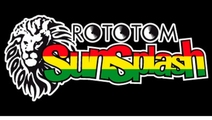
The rapper Matisyahu was taken off the schedule of a Spanish Reggae festival due to his refusal to publicly support creation of a Palestinian state, Spanish media reports.
Valencia's Boycott, Divestment and Sanctions (BDS) movement requested that Rototom, the 22nd European Reggae Festival scheduled for 15-22 August in Benicàssim, cancel Matisyahu's planned performance, stating that the Jewish-American rapper has “participated in pro-Zionist festivals and has said that Palestine does not exist”.
Matisyahu is known for blending Orthodox Jewish themes with reggae, rock and hip hop beatboxing sounds.
Rototom asked Mattisyahu to publicly state whether there is a right to a Palestinian state and whether he rejects Israeli military violence, particularly that during Israel's summer 2014 attack on the Gaza Strip.
“After having repeatedly sought dialogue (with Mattisyahu), the artist was unavailable to speak out clearly against the war and the Palestinians' right to a state of their own. Accordingly, the Mattisyahu concert scheduled fot 22 August was cancelled.
In a statement, Rototom noted that it has “proven countless times (its) sensitivity to Palestine, its people and the occupation, particularly by holding multiple debates in the World Social Forum.” It further deplores the attacks against it following this announcement, noting that it has a 22 year history of “active promotion of peace, social justice and human rights.”
BDS Valencia stated that the success of this campaign is a “cry of popular solidarity.”
Valencia's Boycott, Divestment and Sanctions (BDS) movement requested that Rototom, the 22nd European Reggae Festival scheduled for 15-22 August in Benicàssim, cancel Matisyahu's planned performance, stating that the Jewish-American rapper has “participated in pro-Zionist festivals and has said that Palestine does not exist”.
Matisyahu is known for blending Orthodox Jewish themes with reggae, rock and hip hop beatboxing sounds.
Rototom asked Mattisyahu to publicly state whether there is a right to a Palestinian state and whether he rejects Israeli military violence, particularly that during Israel's summer 2014 attack on the Gaza Strip.
“After having repeatedly sought dialogue (with Mattisyahu), the artist was unavailable to speak out clearly against the war and the Palestinians' right to a state of their own. Accordingly, the Mattisyahu concert scheduled fot 22 August was cancelled.
In a statement, Rototom noted that it has “proven countless times (its) sensitivity to Palestine, its people and the occupation, particularly by holding multiple debates in the World Social Forum.” It further deplores the attacks against it following this announcement, noting that it has a 22 year history of “active promotion of peace, social justice and human rights.”
BDS Valencia stated that the success of this campaign is a “cry of popular solidarity.”
11 aug 2015
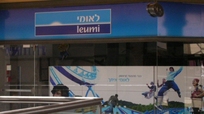
Bank Leumi branch in the East Jerusalem settlement of Pisgat Ze'ev
Recommendations to the EU would “shut down” the Israeli economy.
Israel's financial sector is preparing for the worst following European recommendations not to work with banks invested in the oPt.
Bank heads in Israel are “panicking” over recent recommendations by the European Council on Foreign Relations that the EU abide by its own laws and not work with Israeli banks invested in the occupied Palestinian territory, reports the Hebrew-language daily Ma'ariv.
“This is a mega-event and if it occurs, the economic implications for the banks and Israeli economy are huge,” a senior Israeli banking official told Ma'ariv. “It can bring us to very difficult places and this topic requires management of the highest levels,” he added.
Israeli analyst Ben Caspi states that the EU is positively considering these recommendations. The deterioration in relations between Israel and the United States over the Iran deal, according to diplomatic sources, means that the US is encouraging Europe to intensify actions against Israeli settlement policy.
“When products are labeled it can cause harm here and there in a market share”, said the senior official, “but when they label every credit given by an Israeli bank over the Green Line and boycott that bank, this means a receivership order for all the banks. The European banking and credit system is interconnected with the Israeli economy. No European bank will accompany projects in Israel, it will be impossible to receive credit in Europe and there will be nothing we can do against it.”
“'Credit labeling'” means that every Israeli bank which gives a mortgage for purchasing a flat in Ma'ale Adumim, Ariel, parts of Modi'in etc., enters a black list”, he continued. “The Europeans also include Jerusalem, the Golan Heights, Road 443 and parts of Road 1 in the definition of 'occupied territory'. There is no Israeli bank not involved in these areas. Every provision of credit to a business, every mortgage, can endanger the bank with boycott.”
“This means the imposition of a siege on the Israeli economy, a type of 'shut down'. In such a situation we must organise and turn to the prime minister. Solutions to this issue can come only from the political field. It is much larger than a strictly financial topic.”
The banks are reportedly working to formulate a coherent policy in this matter, and it is expected they will request a “credit and financial security net” from the government should this scenario take place.
“This is a mega-event which must be planned for and digested. This is what we are attempting to do now,” closed the official.
Recommendations to the EU would “shut down” the Israeli economy.
Israel's financial sector is preparing for the worst following European recommendations not to work with banks invested in the oPt.
Bank heads in Israel are “panicking” over recent recommendations by the European Council on Foreign Relations that the EU abide by its own laws and not work with Israeli banks invested in the occupied Palestinian territory, reports the Hebrew-language daily Ma'ariv.
“This is a mega-event and if it occurs, the economic implications for the banks and Israeli economy are huge,” a senior Israeli banking official told Ma'ariv. “It can bring us to very difficult places and this topic requires management of the highest levels,” he added.
Israeli analyst Ben Caspi states that the EU is positively considering these recommendations. The deterioration in relations between Israel and the United States over the Iran deal, according to diplomatic sources, means that the US is encouraging Europe to intensify actions against Israeli settlement policy.
“When products are labeled it can cause harm here and there in a market share”, said the senior official, “but when they label every credit given by an Israeli bank over the Green Line and boycott that bank, this means a receivership order for all the banks. The European banking and credit system is interconnected with the Israeli economy. No European bank will accompany projects in Israel, it will be impossible to receive credit in Europe and there will be nothing we can do against it.”
“'Credit labeling'” means that every Israeli bank which gives a mortgage for purchasing a flat in Ma'ale Adumim, Ariel, parts of Modi'in etc., enters a black list”, he continued. “The Europeans also include Jerusalem, the Golan Heights, Road 443 and parts of Road 1 in the definition of 'occupied territory'. There is no Israeli bank not involved in these areas. Every provision of credit to a business, every mortgage, can endanger the bank with boycott.”
“This means the imposition of a siege on the Israeli economy, a type of 'shut down'. In such a situation we must organise and turn to the prime minister. Solutions to this issue can come only from the political field. It is much larger than a strictly financial topic.”
The banks are reportedly working to formulate a coherent policy in this matter, and it is expected they will request a “credit and financial security net” from the government should this scenario take place.
“This is a mega-event which must be planned for and digested. This is what we are attempting to do now,” closed the official.
4 aug 2015
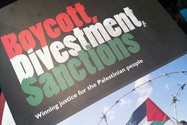
BDS in the United States is preparing to launch the widest campaign for the boycott of Israel which will include student councils from 293 American universities and a renowned church, local Palestinian news agency Quds Net reported yesterday.
Activists preparing for the campaign said in a statement that they are aiming to turn universities and churches to platforms that support Palestinian rights.
BDS members expect the Methodist Church, which represents about eight million Americans, to join the movement next year.
An activist said the campaign started in the Methodist Church a couple of weeks ago, noting that there are preparations for a church conference to be held in May next year in the state of Oregon. They added that they have been updating those who take part in the conference with details about Israeli violations.
Activists preparing for the campaign said in a statement that they are aiming to turn universities and churches to platforms that support Palestinian rights.
BDS members expect the Methodist Church, which represents about eight million Americans, to join the movement next year.
An activist said the campaign started in the Methodist Church a couple of weeks ago, noting that there are preparations for a church conference to be held in May next year in the state of Oregon. They added that they have been updating those who take part in the conference with details about Israeli violations.
31 july 2015
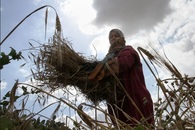
File photo of a Palestinian women harvesting wheat at a farm in Gaza's Rafa
The Arab League General Secretariat will host the 89th meeting next month to discuss and reactivate the Arab boycott of Israel, a senior official has revealed.
Commissioner General of the Arab League's Central Office for the Boycott of Israel (OBI) Mohamed Sabih said in a press statement yesterday: "During the meeting, the OBI will discuss ways to reactivate the Arab boycott of Israel including a review of companies that violate provincials that prohibit dealing with Israel."
The meeting, which is scheduled for 18-20 August in Cairo, Egypt, will focus on amendments to the general principles of the Arab boycott in order to activate it as a mechanism to express the Arab people's "rejection of Israel's practices and violations of Arab territories", he added.
The meeting will address several memoranda relating to commercial and tourist steamboats and tankers that violate the principles of the Arab-Israeli boycott.
It will submit its findings and recommendations to the next Arab foreign ministers' meeting in September.
The Arab League General Secretariat will host the 89th meeting next month to discuss and reactivate the Arab boycott of Israel, a senior official has revealed.
Commissioner General of the Arab League's Central Office for the Boycott of Israel (OBI) Mohamed Sabih said in a press statement yesterday: "During the meeting, the OBI will discuss ways to reactivate the Arab boycott of Israel including a review of companies that violate provincials that prohibit dealing with Israel."
The meeting, which is scheduled for 18-20 August in Cairo, Egypt, will focus on amendments to the general principles of the Arab boycott in order to activate it as a mechanism to express the Arab people's "rejection of Israel's practices and violations of Arab territories", he added.
The meeting will address several memoranda relating to commercial and tourist steamboats and tankers that violate the principles of the Arab-Israeli boycott.
It will submit its findings and recommendations to the next Arab foreign ministers' meeting in September.
23 july 2015
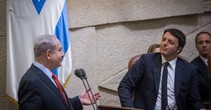
During his visit to Israel, Italian Prime Minister Matteo Renzi gave a speech to the Knesset in which he stressed the relationship and friendship between Italy and Israel, affirming that “Italy will always be in the front line against all forms of boycott, which are futile and stupid “.
In protest, BDS Italia movement said that Renzi’s statement demonstrates his “utter lack of knowledge of the movement for Boycott, Divestment and Sanctions (BDS) launched in July 2005 by a broad coalition of Palestinian civil society as a necessary and moral response to the failure of international institutions to halt Israel’s continuing violations of international law.” [1]
Statement by BDS Italia said that Israel, for decades and with complete impunity, has carried out policies of occupation and colonization, appropriating Palestinian land and resources, building settlements and the Apartheid Wall, approved laws that discriminate against Palestinian citizens of Israel and forced half of the Palestinian population to live as refugees or in exile. [2]
A year after the operation “Protective Edge”, Israel’s third military operation bombarding the Gaza Strip in five years, which caused the death of over 2,200 people, the vast majority civilians and a quarter of them children, Israel continues to prevent the reconstruction of the 18,000 homes damaged with the illegal blockade it has imposed for eight years. [3]
“BDS serves to break the status quo in which Israel continues to violate rights with impunity, thanks to the inaction of States and institutions, and businesses, including Italian firms, continue to profit from this illegal situation,” BDS Italia said. [4]
“In these ten years, the BDS movement has grown steadily, garnering ever more consensus and successes. Among the endorsers of the campaign are trade unions, movements, churches, NGOs, artists and intellectuals, including Ken Loach, Naomi Klein, Roger Waters of Pink Floyd and South African Archbishop and Nobel laureate Desmond Tutu. Thanks to the work of civil society around the world, businesses, banks and pension funds have divested from the Israeli economy and complicit international companies and consumers refuse to buy Israeli products,” they added. [5]
The boycott is a recognized and time-honored non-violent means to apply pressure and withdraw support from systems of injustice, just as was the case of the struggle against apartheid in South Africa. Now more than ever, the BDS campaign in Italy must be intensified in order to end complicity of Italian institutions and companies.
BDS concluded by saying that it is “futile and stupid” to continue to ignore the violations of Israel instead of taking concrete measures to ensure respect for human rights, international humanitarian law and UN resolutions and support the Palestinian call for freedom, justice and equality.
BDS Italia is a movement supporting boycott, divestment and sanctions against Israel, comprised of associations and groups throughout Italy, who endorse the 2005 call from Palestinian civil society and work to promote BDS campaigns and initiatives locally and nationally.
Read More:
Italian PM: Palestinians must accept Israel as a reality___________________________________________
[1] The Palestinian call for Boycott, Divestment and Sanctions (BDS)
Endorsements in Italy:
[2] The Discriminatory Laws Database
Palestinian refugee numbers / whereabouts
[3] Fragmented lives Humanitarian Overview 2014 [PDF]
Eight months after Gaza war, ‘not a single home has been rebuilt’ – UN agency
The Gaza Strip: The Humanitarian Impact of the Blockade [PDF]
[4] The multi-utility ACEA SpA signed an agreement with Mekorot, Israel’s national water company, which extracts water from Palestinians aquifers and serves the illegal Israeli settlements.
Pizzarotti SpA is building the high speed railway linking Tel Aviv and Jerusalem, which cuts through the occupied West Bank, confiscating Palestinian land for a tranportation system reserved for Israelis only.
Alenia Aermacchi sold 30 M-346 trainer jets to Israel.
In January of this year, the same Israeli pilots who razed entire neighborhoods in Gaza last summer began training with the “Made in Italy” aircraft.
[5] The key successes of the BDS movement
In protest, BDS Italia movement said that Renzi’s statement demonstrates his “utter lack of knowledge of the movement for Boycott, Divestment and Sanctions (BDS) launched in July 2005 by a broad coalition of Palestinian civil society as a necessary and moral response to the failure of international institutions to halt Israel’s continuing violations of international law.” [1]
Statement by BDS Italia said that Israel, for decades and with complete impunity, has carried out policies of occupation and colonization, appropriating Palestinian land and resources, building settlements and the Apartheid Wall, approved laws that discriminate against Palestinian citizens of Israel and forced half of the Palestinian population to live as refugees or in exile. [2]
A year after the operation “Protective Edge”, Israel’s third military operation bombarding the Gaza Strip in five years, which caused the death of over 2,200 people, the vast majority civilians and a quarter of them children, Israel continues to prevent the reconstruction of the 18,000 homes damaged with the illegal blockade it has imposed for eight years. [3]
“BDS serves to break the status quo in which Israel continues to violate rights with impunity, thanks to the inaction of States and institutions, and businesses, including Italian firms, continue to profit from this illegal situation,” BDS Italia said. [4]
“In these ten years, the BDS movement has grown steadily, garnering ever more consensus and successes. Among the endorsers of the campaign are trade unions, movements, churches, NGOs, artists and intellectuals, including Ken Loach, Naomi Klein, Roger Waters of Pink Floyd and South African Archbishop and Nobel laureate Desmond Tutu. Thanks to the work of civil society around the world, businesses, banks and pension funds have divested from the Israeli economy and complicit international companies and consumers refuse to buy Israeli products,” they added. [5]
The boycott is a recognized and time-honored non-violent means to apply pressure and withdraw support from systems of injustice, just as was the case of the struggle against apartheid in South Africa. Now more than ever, the BDS campaign in Italy must be intensified in order to end complicity of Italian institutions and companies.
BDS concluded by saying that it is “futile and stupid” to continue to ignore the violations of Israel instead of taking concrete measures to ensure respect for human rights, international humanitarian law and UN resolutions and support the Palestinian call for freedom, justice and equality.
BDS Italia is a movement supporting boycott, divestment and sanctions against Israel, comprised of associations and groups throughout Italy, who endorse the 2005 call from Palestinian civil society and work to promote BDS campaigns and initiatives locally and nationally.
Read More:
Italian PM: Palestinians must accept Israel as a reality___________________________________________
[1] The Palestinian call for Boycott, Divestment and Sanctions (BDS)
Endorsements in Italy:
[2] The Discriminatory Laws Database
Palestinian refugee numbers / whereabouts
[3] Fragmented lives Humanitarian Overview 2014 [PDF]
Eight months after Gaza war, ‘not a single home has been rebuilt’ – UN agency
The Gaza Strip: The Humanitarian Impact of the Blockade [PDF]
[4] The multi-utility ACEA SpA signed an agreement with Mekorot, Israel’s national water company, which extracts water from Palestinians aquifers and serves the illegal Israeli settlements.
Pizzarotti SpA is building the high speed railway linking Tel Aviv and Jerusalem, which cuts through the occupied West Bank, confiscating Palestinian land for a tranportation system reserved for Israelis only.
Alenia Aermacchi sold 30 M-346 trainer jets to Israel.
In January of this year, the same Israeli pilots who razed entire neighborhoods in Gaza last summer began training with the “Made in Italy” aircraft.
[5] The key successes of the BDS movement
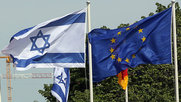
Stocks of Israeli financial institutes drop following report by European think tank recommending restrictions on Israeli banks.
The European Union is not planning to impose sanctions on Israeli banks, a senior EU official said Wednesday, hours after an EU think tank released a report recommending such a course of action.
"We have no intention of imposing restrictions on Israeli banks that do business in the settlements. This entire issue is complete nonsense. This issue has never been considered," the diplomat said.
The European Union agreed this week to push ahead with labeling Israeli goods made in settlements in the West Bank, a move that has alarmed the Israeli government.
Then, in a paper to be published on Wednesday, the European Council on Foreign Relations, whose proposals frequently inform EU policymaking, argued that the EU is in breach of its own laws and must move much more firmly to distinguish its dealings with Israel from Israel's activities in the West Bank and East Jerusalem, which it has captured in 1967 Six-Day War.
The think tank recommended imposing restrictions on Israeli banking, loans and mortgages, qualifications earned in settlement institutions and the tax-exempt status of European charities that deal with Israeli settlements.
The release of the report caused panic in the stock market and led to a drop in Israeli banks' stocks.
The Foreign Ministry and EU officials rushed to issue calming statements by stressing that the report was merely a recommendation and the chances it would be adopted are very small.
"This is an independent research institute that has no connections to the European Union and has no more influence than any other research institute," the European diplomat said. "Anyone can publish reports. It has no basis in reality. There are no plans for further legislation on this issue except for the plans to label settlement products which are moving forward, but have yet to be finalized."
The European Union is not planning to impose sanctions on Israeli banks, a senior EU official said Wednesday, hours after an EU think tank released a report recommending such a course of action.
"We have no intention of imposing restrictions on Israeli banks that do business in the settlements. This entire issue is complete nonsense. This issue has never been considered," the diplomat said.
The European Union agreed this week to push ahead with labeling Israeli goods made in settlements in the West Bank, a move that has alarmed the Israeli government.
Then, in a paper to be published on Wednesday, the European Council on Foreign Relations, whose proposals frequently inform EU policymaking, argued that the EU is in breach of its own laws and must move much more firmly to distinguish its dealings with Israel from Israel's activities in the West Bank and East Jerusalem, which it has captured in 1967 Six-Day War.
The think tank recommended imposing restrictions on Israeli banking, loans and mortgages, qualifications earned in settlement institutions and the tax-exempt status of European charities that deal with Israeli settlements.
The release of the report caused panic in the stock market and led to a drop in Israeli banks' stocks.
The Foreign Ministry and EU officials rushed to issue calming statements by stressing that the report was merely a recommendation and the chances it would be adopted are very small.
"This is an independent research institute that has no connections to the European Union and has no more influence than any other research institute," the European diplomat said. "Anyone can publish reports. It has no basis in reality. There are no plans for further legislation on this issue except for the plans to label settlement products which are moving forward, but have yet to be finalized."
